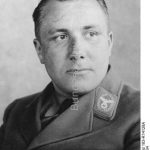Martin Bormann
17.06.1900 – 1945 (?) SS general, Hitler’s personal secretary.
In 1919 he served in nationalist volunteer units (Freikorps). In 1924 he was convicted of participating in a political hood-up murder; member of the NSDAP from 1925, chief of staff of Rudolf Hess from 1933. May 12, 1941 appointed after Hess’es escape to England, as a Hitler’s personal secretary. So calles “eminence” and ruthless advocate of racist ideology. He zealously obeyed all Hitler’s orders. Thanks to his constant presence at Hitler’s side, extraordinary diligence, phenomenal memory, cleverly manipulated plots, manipulations and “inside jobs,” he gained the Führer’s great trust, especially after the assassination attempt on July 20, 1944. He did not enjoy popularity among the environment due to many of his negative traits. Hated even by other close associates of Hitler: Speer, Göring, Goebbels, and Himmler.
After the war, information appeared in the Polish and foreign press that Bormann managed to leave the Third Reich in the last days of the war. According to some speculations, he was supposed to be in England, according to others – in Argentina and Bolivia. The most sensational suggestion seems to be that Bormann, as a Soviet intelligence agent, lived after the end of hostilities in the USSR, where he was to die in 1972. This information was never confirmed.
In December 1972, during the construction works in the center of Berlin at Invalidenstraße (near Lehrter Bahnhof), the skeletons of two men were found. Based on the state of dentition and other anatomical features, they were formally identified by a German court as the remains of Bormann and Stumpfegger. On April 11, 1973, Prosecutor General Horst Gauf said that, according to German court, Martin Bormann was killed early in the morning on May 2, 1945, during the last fighting in Berlin. Bormann’s remains were identified and handed over to the family for burial.
In the skulls of both skeletons, particles of glass from cyanide capsules were found, which would mean that they both committed suicide by taking this poison. DNA tests carried out in 1998 confirmed the accuracy of the court ruling. The Bormann family did not allow burial, not wanting his grave to become the object of neo-Nazis pilgrimage. The bones were therefore cremated and their ashes were scattered by their firstborn son Bormann in the Baltic Sea.
 English
English polski
polski



